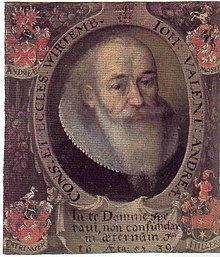This article includes a list of references, related reading, or external links, but its sources remain unclear because it lacks inline citations. (May 2014) |
Johannes Valentinus Andreae | |
|---|---|
 Johannes Valentinus Andreae | |
| Born | 17 August 1586 |
| Died | 27 June 1654 (aged 67) |
| Parent(s) | Johannes Andreae (1554–1601) Maria Moser |
Johannes Valentinus Andreae (17 August 1586 – 27 June 1654), a.k.a. Johannes Valentinus Andreä or Johann Valentin Andreae, was a German theologian, who claimed to be the author of an ancient text known as the Chymische Hochzeit Christiani Rosencreutz anno 1459 (published in 1616, Strasbourg; in English Chymical Wedding of Christian Rosenkreutz in 1459). This became one of the three founding works of Rosicrucianism, which was both a legend and a fashionable cultural phenomenon across Europe in this period.
Andreae was a prominent member of the Protestant utopian movement which began in Germany and spread across northern Europe and into Britain under the mentorship of Samuel Hartlib and John Amos Comenius. The focus of this movement was the need for education and the encouragement of sciences as the key to national prosperity. But like many vaguely-religious Renaissance movements at this time, the scientific ideas being promoted were often tinged with hermeticism, occultism and neo-Platonic concepts. The threats of heresy charges posed by rigid religious authorities (Protestant and Catholic) and a scholastic intellectual climate often forced these activists to hide behind fictional secret societies and write anonymously in support of their ideas, while claiming access to "secret ancient wisdom".